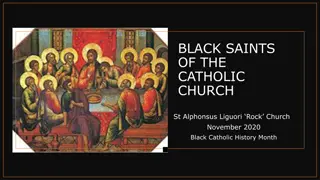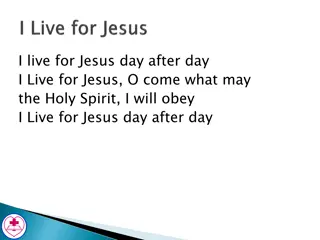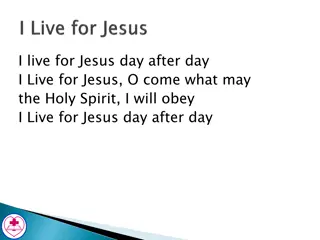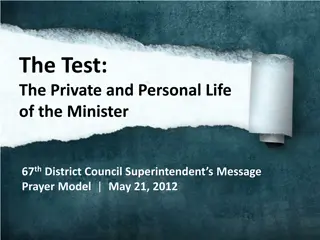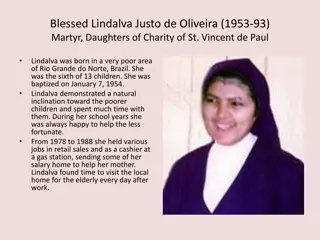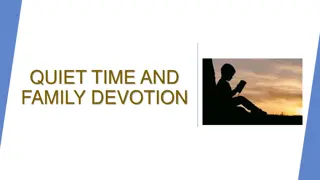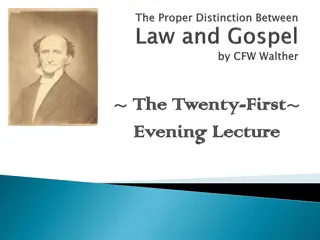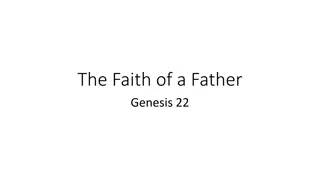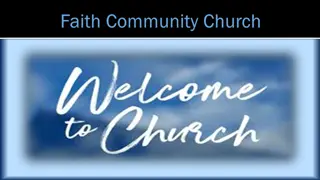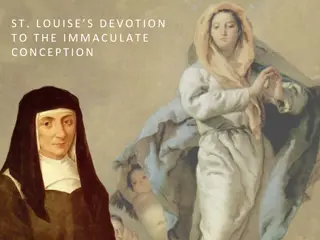Life Events of Blessed Kateri Tekakwitha - Inspiring Journey of Faith and Devotion
Kateri Tekakwitha, known as the Lily of the Mohawks, led a remarkable life of faith and devotion. Born in 1656, she overcame challenges and persecution to live a devout Christian life, symbolizing the virtues of kindness, determination, and undying faith. Despite hardships, she remained committed to serving God and others, inspiring many with her exemplary life. Blessed Kateri Tekakwitha's journey culminated in her canonization as a saint, marking her legacy of love and devotion for generations to come.
Uploaded on Feb 23, 2025 | 1 Views
Download Presentation

Please find below an Image/Link to download the presentation.
The content on the website is provided AS IS for your information and personal use only. It may not be sold, licensed, or shared on other websites without obtaining consent from the author.If you encounter any issues during the download, it is possible that the publisher has removed the file from their server.
You are allowed to download the files provided on this website for personal or commercial use, subject to the condition that they are used lawfully. All files are the property of their respective owners.
The content on the website is provided AS IS for your information and personal use only. It may not be sold, licensed, or shared on other websites without obtaining consent from the author.
E N D
Presentation Transcript
Kateri Tekakwitha By Kaelynn Olmos & Maya Sanchez ^.^
About Kateri Tekakwitha known as Lily of the Mohawks born around 1656 in the Mohawk village of Ossernenon near present- day Auriesville, New York. the daughter of a Mohawk warrior Her parents and brother died from smallpox baptized at the age of 20, on Easter Sunday, April 5, 1676 professed a vow of virginity until her death at the age of 24. died on April 17, 1680 at the age of 24, in the arms of her friend Marie- Ther se. her final words were, lesos Konoronkwa. meaning Jesus, I love You.
Key Events of Her Life (: The stories her mother told her about her Catholic faith remained impressed in her heart and mind which gave her shape and direction for her destiny When Tekakwitha was eighteen, Father de Lamberville, a Jesuit missionary, came to Caughnawaga and established a chapel. became a Christian and was baptized on April 5th 1676 Because of increasing hostility from her people and because she wanted to devote her life to working for God, in July of 1677, Kateri left her village and fled to the Catholic mission of St. Francis Xavier at Sault Saint- Louis. Kateri led a life of prayer and penitential practices.
Key Events of Her Life (: Continued She taught the young and helped those in the village who were poor or sick. Kateri spoke words of kindness to everyone she encountered Because of her determination in proving herself worthy of God and her undying faith she was allowed to receive her First Holy Communion on Christmas Day, 1677. Kateri's motto became, "Who can tell me what is most pleasing to God that I may do it?" On March 15, 1679, at the Feast of the Annunciation, she pronounced her vow of perpetual virginity Kateri hoped to start a convent for Native American sisters in Sault St. Louis but her spiritual director, Father Pierre Cholonec discouraged her. Kateri's health, never good, was deteriorating rapidly due in part to the penances she inflicted on herself. Father Cholonec encouraged Kateri to take better care of herself but she laughed and continued with her "acts of love."
Key Events of Her Life (: Continued died in 1680 at the age of 24. Her last words were, "Jesus, I love You. The Catholic Church declared Kateri venerable in 1943. She was beatified in 1980 by Pope John Paul II. is the first Native American to be declared Blessed. Her feast is celebrated on July 14th in the United States. Pope John Paul II designated Blessed Kateri as a patroness for World Youth Day 2002. On December 19, 2011, Pope Benedict XVI signed the decree necessary for the canonization of Blessed Kateri. Blessed Kateri will be canonized as a saint on October 21, 2012.
Obstacles/ Hardships :c Her parents and brother died form smallpox survived the small pox but was left with scars and impaired eyesight Her impaired eyesight made it difficult for her to see was orphaned but adopted by her aunt and uncle After her baptism, Kateri became the village outcast. Her family refused her food on Sundays because she wouldn't work. Children would taunt her and throw stones. She was threatened with torture or death if she did not renounce her religion.
Head, Heart, Hands Kateri s faith is strong mentally because she knows that God is always by her side and will never abandon her even though she went through pretty hard times. Kateri s faith is strong eternally because she loves God with all her heart, soul, and mind. She shares her faith and love to the sick and poor around her. Kateri puts her faith to work by teaching the young and helping those in the village who were poor or sick and carried her faith wherever she went.
How Prayer was featured in Her Daily Life She often went to the woods alone to speak to God and listen to Him in her heart and in the voice of nature (before she was baptized). Her favorite devotion was to fashion crosses out of sticks and place them throughout the woods. These crosses served as stations that reminded her to spend a moment in prayer. spent much of her time in prayer before the Blessed Sacrament, kneeling in the cold chapel for hours. When the winter hunting season took Kateri and many of the villagers away from the village, she made her own little chapel in the woods by carving a Cross on a tree and spent time in prayer there, kneeling in the snow. Kateri loved the Rosary and carried it around her neck always.
Why Can Kateri Be Called A Christian Witness? Kateri can be called a Christian witness because she has "openly profess faith in God through their words and actions."(Isaiah 43:8- 12/Isaiah 44:8).
Inspirational Quote ~(^o^)~ I am not my own; I have given myself to Jesus. He must be my only love the state of helplessness poverty that may befall if I do not marry it does not frighten me. All I need is a few pieces of clothing and food with the work of my hands I shall always earn what is necessary and what is left over ill give to my relatives and ill give to the poor if I should become sick and unable to work, then I shall be like the Lord on the cross he will have mercy on me and help me, I'm sure.





